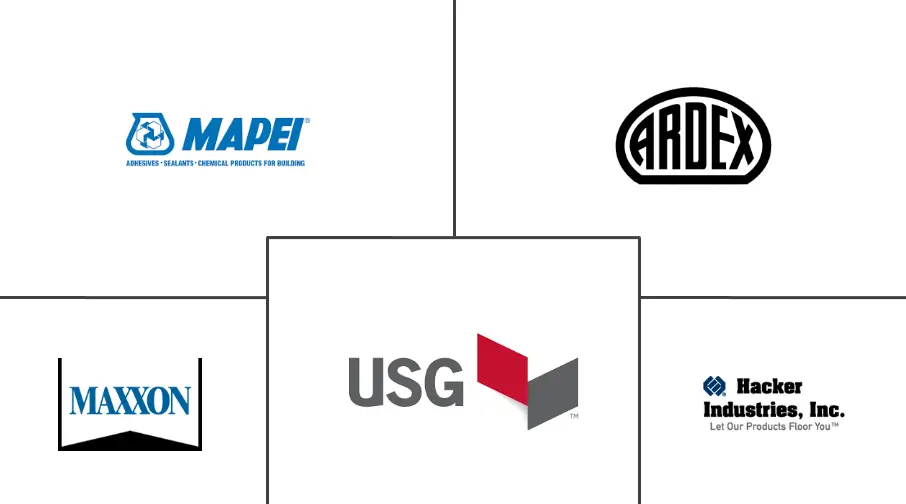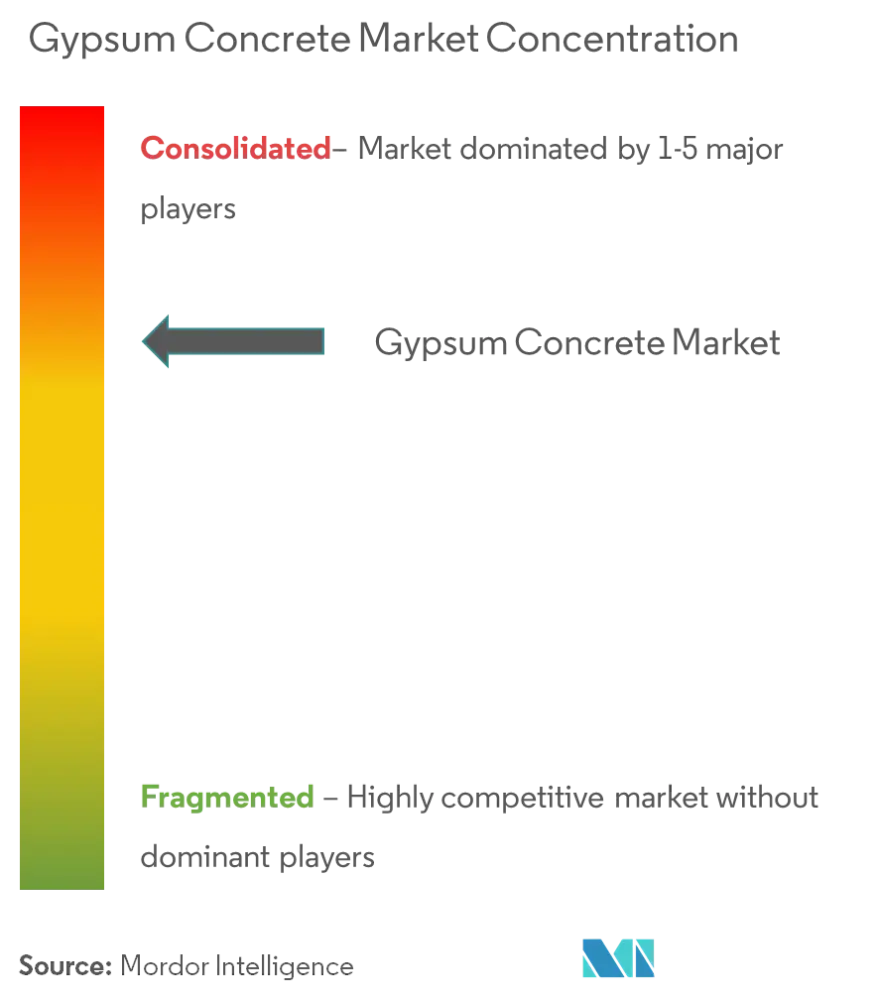Gypsum Concrete Market Size

| Study Period | 2019 - 2029 |
| Base Year For Estimation | 2023 |
| CAGR | 8.00 % |
| Fastest Growing Market | Asia Pacific |
| Largest Market | North America |
| Market Concentration | High |
Major Players
*Disclaimer: Major Players sorted in no particular order |
Gypsum Concrete Market Analysis
The global gypsum concrete market is estimated to witness a healthy growth, at an estimated CAGR of around 8%, over the forecast period. Factors, such as superior characteristics of gypsum concrete, rising demand for sound reduction and lightweight materials, and growing demand for underfloor radiant heating systems, have been driving the growth of gypsum concrete market.
- Lack of awareness among consumers, with limited popularity of gypsum concrete in North American region stands to be a constraint in the studied market.
- North America stands to be the largest market for gypsum concrete, in terms of consumption. However, regions like Asia-Pacific and Europe are expected to register significant growth over the forecast period.
Gypsum Concrete Market Trends
This section covers the major market trends shaping the Gypsum Concrete Market according to our research experts:
Increasing Demand from Residential Construction
- In residential construction, sound transmission has become an important consideration, along with structural design due to increasing trend of high-rise housing towers, along with basement parking. Due to closely attached residential flats in high-rise housing towers, sound-proof and heat insulating material are widely suitable. Therefore, while gypsum concrete exhibits such required properties, it is widely suitable for use in residential construction.
- Residential construction has been witnessing strong growth in regions, like Asia-Pacific, North America and Europe which is expected to significantly contribute to the growth of gypsum concrete market.
- Asia-Pacific has been witnessing strong growth in the residential construction in countries such as India, China, Philippines, Vietnam, and Indonesia. In these countries, demand is majorly driven by the increased migration as a result of growing service industry, rising population, and rise in income levels.
- In Indonesia, the government planned to invest in construction sector about USD 450 billion by 2021, which is expected to provide boost to residential construction in the country.
- India is likely to witness an investment of around USD 1.3 trillion in housing over the next seven years, where the country is likely to witness the construction of 60 million new homes. The availability of affordable housing is expected to rise around 70% by 2024, in India. Besides, the Indian government's ‘Housing for All by 2022’ is also a major game changer for the industry.
- Therefore, such robust growth in residential construction across these regions are likely to boost the demand for gypsum concrete market during the forecast period.

North America Region to Dominate the Market
- North America dominated the global market share. With growing investments and the construction activities in the region, the demand for gypsum concrete is projected to grow during the forecast period.
- The construction industry in the United States continued to expand, owing to a strong economy and positive market fundamentals for commercial real estate, along with an increase in federal and state funding for public works and institutional buildings.
- The construction industry has been showing steady growth so far, and this is projected to continue at a rate of 4.5% through 2020.
- The US residential sector’s growth is slower than the non-residential sector. In the country, the growing population is expected to boost the demand for housing. Furthermore, about 20 million households are projected to be constructed over the next decade. The US commercial construction sector is expected to witness growth in the next few years.
- Single‐family housing units and building with five units or more are at a rate of 866,000 and 509,000 respectively.
- The expenditures of United States on commercial building construction are forecasted to grow more than 4% annually through the forecast period.
- Hence, all such trends in the construction sector is expected to drive the growth of gypsum concrete market during the forecast period.

Gypsum Concrete Industry Overview
The market for gypsum concrete is partially consolidated in nature. The major players include Hacker Industries, Inc., USG Corporation, and MAXXON, INC., among others.
Gypsum Concrete Market Leaders
-
Hacker Industries, Inc.
-
USG Corporation
-
MAXXON, INC.
*Disclaimer: Major Players sorted in no particular order

Gypsum Concrete Market Report - Table of Contents
1. INTRODUCTION
- 1.1 Study Assumptions
- 1.2 Scope of the Study
2. RESEARCH METHODOLOGY
3. EXECUTIVE SUMMARY
4. MARKET DYNAMICS
-
4.1 Drivers
- 4.1.1 Superior Properties of Gypsum Concrete
- 4.1.2 Rising Demand for Sound Reduction and Lightweight Materials
- 4.1.3 Increased Demand for Under-floor Heating Systems
-
4.2 Restraints
- 4.2.1 Lack of Awareness among Consumers
- 4.3 Industry Value-Chain Analysis
-
4.4 Porter's Five Forces Analysis
- 4.4.1 Bargaining Power of Suppliers
- 4.4.2 Bargaining Power of Consumers
- 4.4.3 Threat of New Entrants
- 4.4.4 Threat of Substitute Products and Services
- 4.4.5 Degree of Competition
5. MARKET SEGMENTATION
-
5.1 Product Type
- 5.1.1 Gypsum Compound Concrete
- 5.1.2 Gypsum Fiber Concrete
- 5.1.3 Gypsum Foam Concrete
- 5.1.4 Other Product Types
-
5.2 Sub-floor Type
- 5.2.1 Concrete Floor
- 5.2.2 Wooden Floor
- 5.2.3 Corrugated Steel Deck Floor
- 5.2.4 Radiant Heating Floor
- 5.2.5 Other Sub-floor Types
-
5.3 Application
- 5.3.1 Residential
- 5.3.2 Commercial
- 5.3.3 Industrial
-
5.4 Geography
- 5.4.1 Asia-Pacific
- 5.4.1.1 China
- 5.4.1.2 India
- 5.4.1.3 Japan
- 5.4.1.4 South Korea
- 5.4.1.5 Rest of Asia-Pacific
- 5.4.2 North America
- 5.4.2.1 United States
- 5.4.2.2 Canada
- 5.4.2.3 Mexico
- 5.4.3 Europe
- 5.4.3.1 Germany
- 5.4.3.2 United Kingdom
- 5.4.3.3 France
- 5.4.3.4 Italy
- 5.4.3.5 Rest of Europe
- 5.4.4 South America
- 5.4.4.1 Brazil
- 5.4.4.2 Argentina
- 5.4.4.3 Rest of South America
- 5.4.5 Middle-East and Africa
- 5.4.5.1 Saudi Arabia
- 5.4.5.2 South Africa
- 5.4.5.3 Rest of Middle-East and Africa
6. COMPETITIVE LANDSCAPE
- 6.1 Mergers and Acquisitions, Joint Ventures, Collaborations, and Agreements
- 6.2 Market Share Analysis**
- 6.3 Strategies Adopted by Leading Players
-
6.4 Company Profiles
- 6.4.1 Accu-Crete
- 6.4.2 ACG Materials
- 6.4.3 ARDEX Group
- 6.4.4 Formglas Products Ltd
- 6.4.5 Hacker Industries, Inc.
- 6.4.6 Janes Gypsum Floors Inc.
- 6.4.7 MAPEI SpA
- 6.4.8 MAXXON, INC.
- 6.4.9 USG Corporation
- 6.4.10 Warmboard
- *List Not Exhaustive
7. MARKET OPPORTUNITIES AND FUTURE TRENDS
** Subject To AvailablityGypsum Concrete Industry Segmentation
The global gypsum concrete market report includes:
| Product Type | Gypsum Compound Concrete | |
| Gypsum Fiber Concrete | ||
| Gypsum Foam Concrete | ||
| Other Product Types | ||
| Sub-floor Type | Concrete Floor | |
| Wooden Floor | ||
| Corrugated Steel Deck Floor | ||
| Radiant Heating Floor | ||
| Other Sub-floor Types | ||
| Application | Residential | |
| Commercial | ||
| Industrial | ||
| Geography | Asia-Pacific | China |
| India | ||
| Japan | ||
| South Korea | ||
| Rest of Asia-Pacific | ||
| Geography | North America | United States |
| Canada | ||
| Mexico | ||
| Geography | Europe | Germany |
| United Kingdom | ||
| France | ||
| Italy | ||
| Rest of Europe | ||
| Geography | South America | Brazil |
| Argentina | ||
| Rest of South America | ||
| Geography | Middle-East and Africa | Saudi Arabia |
| South Africa | ||
| Rest of Middle-East and Africa |
Gypsum Concrete Market Research FAQs
What is the current Gypsum Concrete Market size?
The Gypsum Concrete Market is projected to register a CAGR of greater than 8% during the forecast period (2024-2029)
Who are the key players in Gypsum Concrete Market?
Hacker Industries, Inc., USG Corporation and MAXXON, INC. are the major companies operating in the Gypsum Concrete Market.
Which is the fastest growing region in Gypsum Concrete Market?
Asia Pacific is estimated to grow at the highest CAGR over the forecast period (2024-2029).
Which region has the biggest share in Gypsum Concrete Market?
In 2024, the North America accounts for the largest market share in Gypsum Concrete Market.
What years does this Gypsum Concrete Market cover?
The report covers the Gypsum Concrete Market historical market size for years: 2019, 2020, 2021, 2022 and 2023. The report also forecasts the Gypsum Concrete Market size for years: 2024, 2025, 2026, 2027, 2028 and 2029.
Gypsum Concrete Industry Report
Statistics for the 2024 Gypsum Concrete market share, size and revenue growth rate, created by Mordor Intelligence™ Industry Reports. Gypsum Concrete analysis includes a market forecast outlook to 2029 and historical overview. Get a sample of this industry analysis as a free report PDF download.



